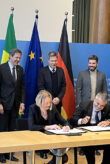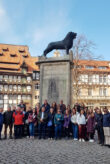The bilateral project »Quality Infrastructure for Renewable Energies and Energy Efficiency in Mexico« is being realized by the Technical Cooperation Department since 2013 on behalf of the Federal Ministry for Economic Cooperation and Development (BMZ) as a part of the German-Mexican development program »Sustainable Energy in Mexico«. During the course of this project, we successfully advised 21 small and medium-sized enterprises in the introduction of energy management systems (EnMS) and accompanied them in this process.
The pilot project »Introduction of Energy Efficiency and Energy Management Systems in SMEs in Mexico« is being realized in collaboration with the Comision Nacional para el Uso Eficiente de la Energia (CONUEE) since the end of 2015. The intermittent short-term expert Richard Prem provided subject-related assistance for the measure. We completed the pilot project with considerable results after a course of 18 months. We presented the documentation of the results at the closing ceremony which took place on 17 October in Mexico City.
In total, the 21 participating enterprises achieved reductions of 57.7 GWh and of 14820 t of CO2. That equates to a value of 62 million pesos (or 3.1 million euros). A few enterprises that did not fulfil Mexican criteria for SMEs, however, also participated in the project as their profiles represented an interesting case: One of these enterprises – a coffee producer from Chiapas – achieved the highest level of reductions, in fact 52 million pesos. The remaining enterprises achieved a total savings of 10 million pesos or 500,000 euros. In addition to this effect, we were also able to document a number of improvements in product quality and increased productivity in SMEs.
In terms of the measures in planning or those in the process of implementation, three large projects with the potential to save 47.6 GWh stand out: In the area of operational control (16.8 GWh), in heat recycling (16.5 GWh) and in combined heat and power (CHP) (14.3 GWh). Concerning the rest of the projects, more than 50 % are in the area of heat recycling, approximately 15 % are in the area of operational control, about 10 % are in the area of compressed air and almost 5 % in the area of lighting. In the remaining projects, measures are implemented which require the reorientation of the operational procedures and of the machines.
The pilot project was launched in 2015 with the signing of an implementation agreement between CONUEE, PTB and the participating enterprises. All participants of the implementation agreement specified their willingness and commitment. At the same time, at a kick-off workshop, instruction on the most important content of ISO 50001:2011 took place.

Additionally, energy audits were carried out in each enterprise with the support of four Mexican experts to collect the basic information needed for an energy management system and to identify potential areas to save money. In the following 12 months, the companies were led through a number of workshops, training courses and regular discussion meetings to introduce an energy management system and energy efficiency measures. In the final phase, the state of implementation of each system was confirmed within the scope of an internal audit.
Thanks to the projects which are currently in planning or in the process of implementation or which have already been completed, the SMEs reduce their energy consumption on average by 7 %. In addition to this, they elaborated in the energy audits further possibilities for improving the energy-related output in the future.
To optimize the operational control, possibilities for improvement were identified which do not require investment from the enterprise. The measures are especially motivating during the introduction of an EnMS because they reveal possibilities that would otherwise not be discovered. Half of the measures have an amortization rate of less than one year; over 70 % of the measures have an amortization rate of less than three years. Of course, measures which quickly free up invested capital are preferred.
All participants were very pleased at the end of the pilot project. Lissette Mendoza Barrón, who was responsible for the implementation of the pilot project within CONUEE, believes that the pilot project provides adequate practical experience in order to bring about more projects of this kind. They can provide SMEs with an opportunity to manage their energy use and improve their mid and long-term competitiveness. Susanne Wendt, PTB project coordinator, agrees with this assessment. During the course of almost two years, PTB and CONUEE have invested more than 900 specialist work days for the implementation of this activity. We are very proud of the results.









